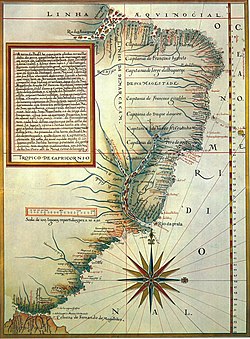Governorate General of Brazil Governo-Geral do Brasil | |
|---|---|
| 1549–1572 1578–1607 1613–1621 | |
 Captaincies of the Governorate General of Brazil by 1574 | |
| Status | Colonial State of the Portuguese Empire |
| Capital | São Salvador |
| Common languages | Portuguese |
| Religion | Roman Catholicism |
| Government | Monarchy |
| Monarch | |
• 1549–1557 | John III |
• 1598–1621 | Philip II |
| Governor General | |
• 1549–1553 | Tomé de Sousa |
| History | |
• Established | 1549 |
• Disestablished | 1621 |
| Currency | Portuguese Real |
| ISO 3166 code | BR |
The Governorate General of Brazil (Governo-Geral do Brasil) was a colonial administration of the Portuguese Empire in present-day Brazil. A governorate was equivalent in status to a viceroyalty, though the title viceroy didn't come into use until the early 18th century. They were ruled by a Governor General who reported to the Crown. The Governor General had direct authority over the constituent royal captaincies, and nominal but ill-defined authority over the donatary captaincies. One captaincy, that of Duarte Coelho in Pernambuco, was exempt by royal decree from the authority of the Governors General.

